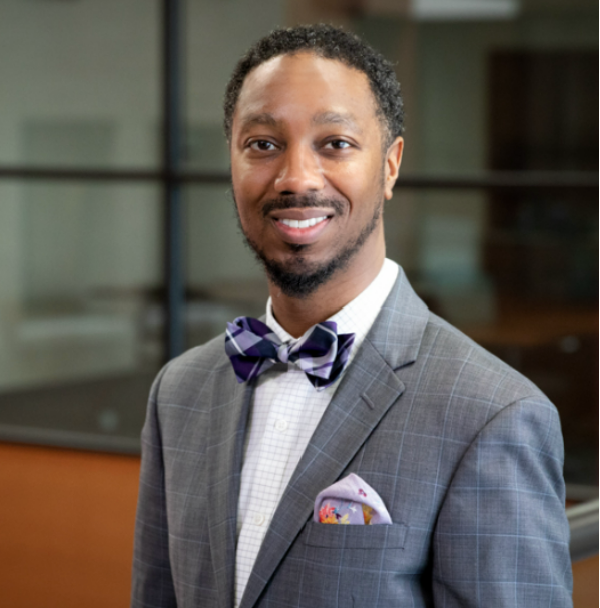New $1.25M Wei LAB project seeks to warm ‘chilly climate’ in STEM for underrepresented
Engineering professional societies to receive new tools and resources to promote DEI culture change
January 10, 2024 | By Karen Rivedal, WCER Communications

Brian Burt is leading the project to support fuller engagement of underrepresented groups in STEM.
Driven by the goal of improving the country’s ability to solve complex problems, a partnership led by UW–Madison’s Wei LAB will help engineering societies apply a newly released international standard on diversity and inclusion. It aims to foster STEM disciplinary excellence by supporting fuller engagement of women and minoritized people in STEM workforce and academic settings.
Project leaders say science, technology, engineering, and mathematics (STEM) professional societies are uniquely positioned to advance national-level diversity, equity, and inclusion (DEI) reform for underrepresented groups. Engineering societies were selected from among the STEM disciplines for the project because engineers are seen as especially attuned to standards.
Project leaders believe positive, evidence-based culture change that succeeds in attracting and retaining more members of underrepresented groups is needed in STEM because evidence shows that well-trained and diverse work teams made up of fully engaged individuals are most effective at solving complicated problems, developing innovative products, and maintaining resilience in crises. But too many work teams in STEM-related business and academia still fail to match this profile.
“Evidence indicates that minoritized STEM-trained individuals experience chilly climate and marginalization in STEM disciplines’ academic and organizational cultures,” according to the project overview. “STEM culture change is needed if the United States is to meet current STEM demands.”
The project, “Raising Equity Values with the Inclusive Professional Framework and ISO DEI Standards in Societies,” (REVIIS) continues through July 2026. Findings and resources will be shared on a project website and in manuals, webinars, journal articles, and professional development for change leaders.
Project leaders expect that the outcomes and findings of the project will have broad impact. The work could inform reform efforts not only within engineering societies, but also across society members’ academic institutions, STEM accrediting bodies, national laboratories, STEM industry, and government.
"This project is an exciting opportunity to create scalable change,” says Brian Burt, director and chief research scientist for Wisconsin’s Equity and Inclusion Laboratory (Wei LAB). “Many times, change is thought to occur at the individual level. Through this project, we are aiming to see how changing dispositions toward DEI can be amplified through disciplinary societies."
One of five project partners nationally recognized as STEM DEI leaders, Burt is principal investigator (PI) for the 3-year project, supported by $1.25 million in National Science Foundation ADVANCE Partnership funding. Wei LAB Assistant Director Don Gillian-Daniel was the original PI, before he transferred project leadership to assume new duties in the College of Engineering.
“Don’s leadership in the NSF INCLUDES Aspire Alliance is the reason the partnership grant was awarded to UW–Madison,” Burt says. “We're grateful for his innovative vision and commitment to DEI in STEM."
The project is housed at the Wisconsin Center for Education Research, part of the university’s School of Education.
Much of its strategy to create conditions leading to more and better-engaged, diverse work teams involves helping engineering societies and related stakeholders make use of the new international standard around creating blueprints for diversity and inclusion (D&I) in organizations.
Described as an “actionable guide to achieve D&I goals,” the standard (ISO:30415) promotes commitment to D&I and addresses inequities in processes and practices that stem from bias, conscious or unconscious.
Project partner James Felton Keith described the standard as a “delivery mechanism for organizational inclusion.”
“It works best by establishing basic infrastructure across four categories: governance, product development, human resources, and supplier diversity to deliver dynamic DEI projects as a service across the organization,” Keith says. “The standard allows management to measure progress as delivery scales up or down across the portfolio of services."
Specifically, the project will work with two cohorts totaling up to 15 engineering professional societies, with an emphasis on engaging progressively larger circles of influence within and across multiple societies simultaneously.
The three target audiences for project outreach are individual member-level change leaders; society change leaders, or those with the power to make organization-level change; and cohort-level leaders, or those who can make collective change across like-minded associations. Certain STEM-related stakeholders, such as accrediting organizations for universities and societies, also will be engaged.
The project will use a two-phase approach to promote increased awareness, knowledge, and use of the standard.
Project leaders will first devise and pilot a standard-informed web platform tailored for engineering societies to identify areas of DEI strength and weakness. In phase two, the project will develop and deploy research-based strategies to effect change, including ‘how-to’ tools and resources.
Use of another tool, the “Inclusive Professional Framework for Societies,” will help standardize the process for effecting culture change by surfacing outdated, exclusionary mental models in engineering disciplinary culture.
The project partners and their roles include:
- Gretal Leibnitz, Faculty Associate in the College of Engineering and Computer Science at the University of Texas Rio Grande Valley and founding director of the ADVANCE Implementation Mentors (AIM) Network. Leibnitz is the project’s director and co-PI.
- Keith is CEO of New York-based Inclusion Score, a standard-based assessment for diversity and inclusion insurance.
- Jacqueline El Sayed, chief administrative officer of the American Society of Engineering Education, is co-PI for the project.


